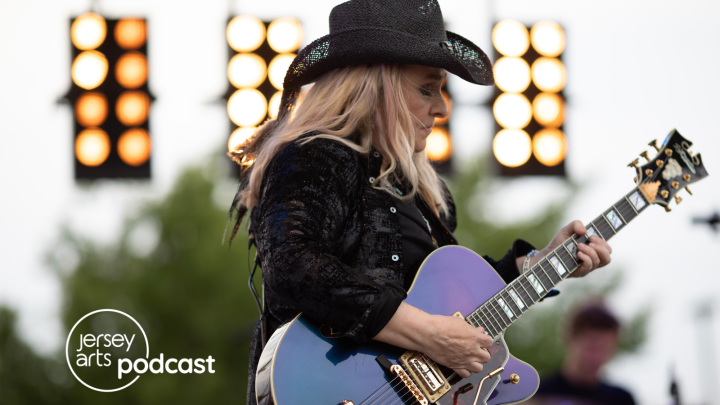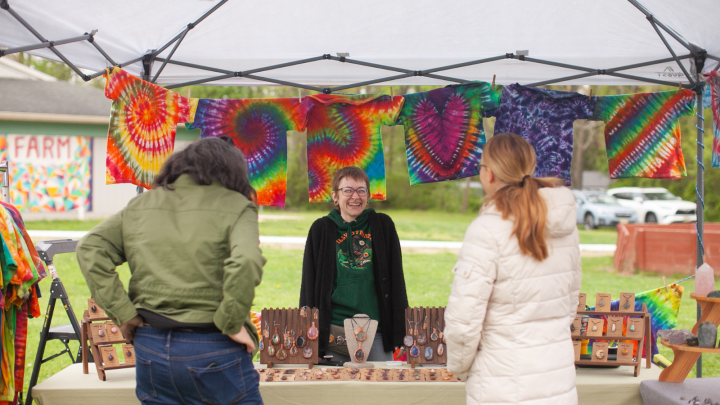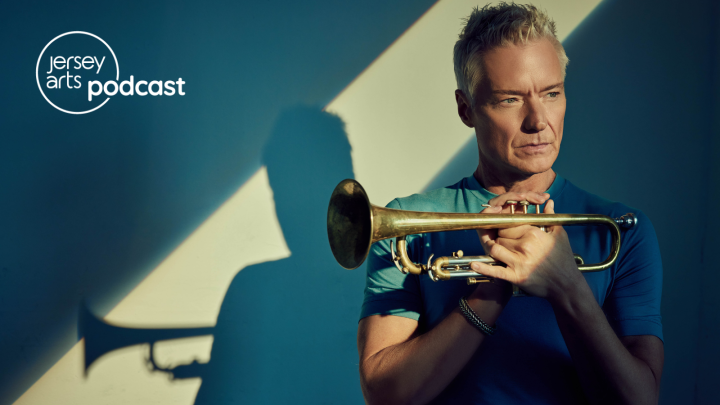XPoNential Recap: Saturday
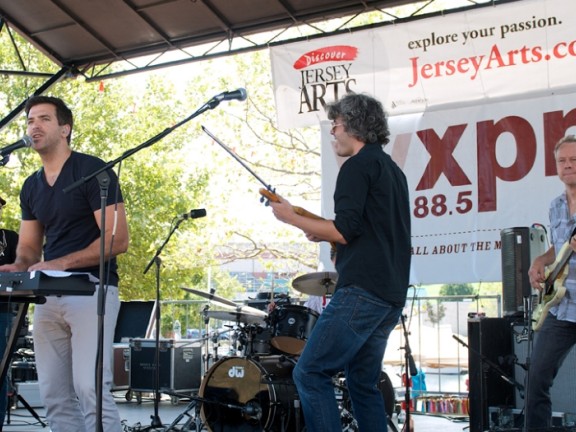
Every year, the XPoNential Music Festival mixes two exciting elements: some of the biggest and most buzzed-about names in alt, rock and Americana playing sets in front of a breathtaking view of the Philadelphia skyline.
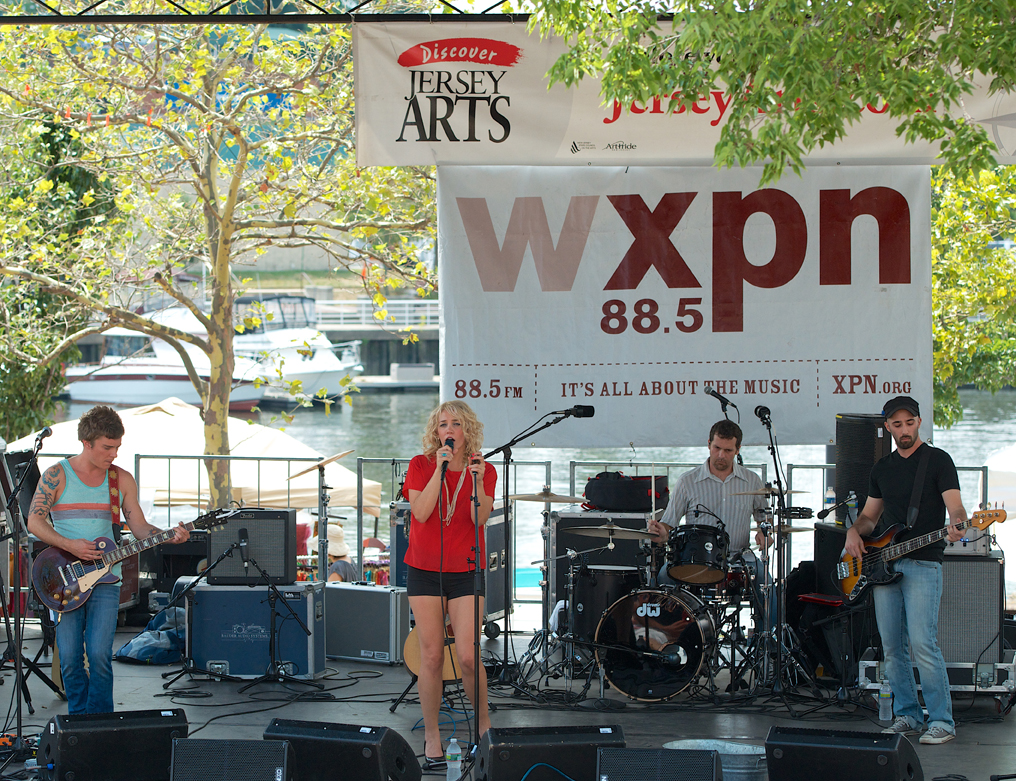
The festival — sponsored by trend-setting public radio station WXPN 88.5-FM — returned to Camden this past weekend. An eclectic lineup commanded the picturesque outdoor stages at Wiggins Park on the Delaware River: The Hold Steady, War On Drugs, The Lumineers, Diego Garcia, Dana Alexander.
And at night, for the first time, the fest moved over the Susquehanna Bank Arts Center amphitheater, where Wilco, Counting Crows, The Avett Brothers, Dr. Dog, and Delta Spirit played sets.
In between, Jersey Arts was on the scene. Rich Ratner snapped photographs of the performances, while writers Brent Johnson and Shen Shellenberger spoke with some of the acts about eating before shows, their upcoming projects, singable New Jersey town names, and more.
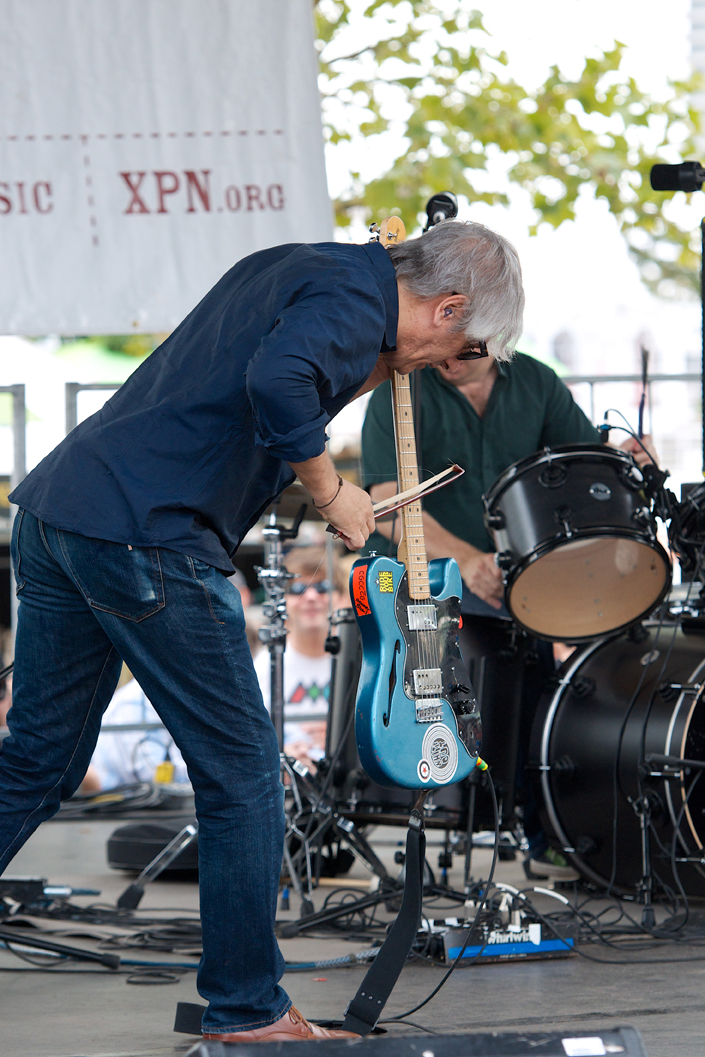
LEE RANALDO
He’s one of alt-rock’s guitar heroes. Lee Ranaldo has spent the last three decades breaking new ground with alternate string tunings and waves of feedback as one-fourth of Sonic Youth. Esteemed Rolling Stone writer David Fricke ranked him the No. 33 greatest guitarist of all time. But Sonic Youth has been on hiatus of late. Frontman Thurston Moore and bassist Kim Gordon separated last year after 27 years of marriage. And Ranaldo — who often only wrote and sang a couple of songs on Sonic Youth records — has been touting his excellent solo debut, Between The Times And The Tides, which is one part melodic and one part experimental.
Jersey Arts: What about the new record are you most proud of?
Lee Ranaldo: I wanted to make a solo record of the songs I’ve written and sang for a long time. I love the way it came out. If you had asked me when I started working on it what I wanted it to sound like, I couldn’t have ask for anything more than how it came out. I just proud that I finally did it. [laughs]
JA: Do any of the songs go back a long time?
LR: Not at all. They were all written in the year before the record was made pretty much. I’ve got a lot of older songs that have been sitting on cassette tapes in drawers. But about a year before the record was recorded, I got asked to do this solo show in France where they asked me to do an acoustic show. I thought I would do [Sonic Youth songs] “Eric’s Trip” and “Hey Joni” on acoustic, because a lot of that stuff was written on acoustic guitar to start. But this song called “Lost” popped out. And a week later, I was playing it onstage and I was like, “That was pretty easy.” And all summer, these songs just started popping out. And by the fall, I started thinking about recording. So they happened pretty fast.
JA: Do you prefer playing outdoor shows or indoor shows?
LR: I like to play indoors mostly. We’ve gotten to the point where we can have fun playing outdoors. But indoors, you’ve got a kind of container for the sound. I think generally, it sounds better indoors. I think there are less distraction. I generally like the way a room contains music.
JA: Does it matter to you if Sonic Youth makes the Rock & Roll Hall of Fame? Would you like to see that happen?
LR: We joke about it. [You’re eligible for induction] 25 years after your first record. We’ve been eligible for five or six years now. It doesn’t concern us in a big way. It’d be a pat on the back. But it’s not something we think too much about. It’d be interesting to see if it happens. We’re at the point now where some friends of ours are in there. The Beasties and Chilis got in this year. Who knows? It’s not high on our minds.
JA: Is there a chance of another Sonic Youth project?
LR: I couldn’t tell you. I really couldn’t tell you. I don’t think any of us are thinking about it right now. I don’t think any of us will think about it for a while. Given everything that’s happened, I think we’re kind of content to go about our own business. We’ll see what happens when it happens, if it happens.
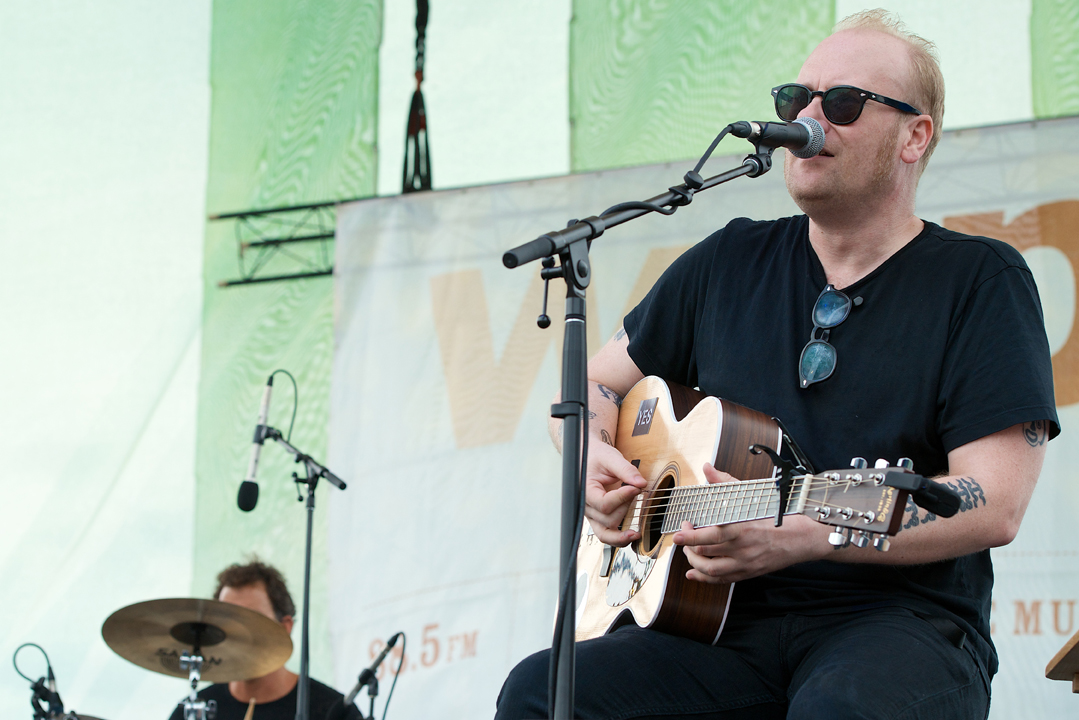
MIKE DOUGHTY
Soul Coughing never found the mega-fame some of their 1990s alt-rock peers did. But frontman Mike Doughty & Co. still assembled a catalogue of clever, tuneful music. Dave Matthews Band even covered one of their songs in concert. These days, the ever-affable, ever-melodic Doughty crisscrosses the country as an entertaining solo act.
Jersey Arts: You have a song called “Busting Up A Starbucks.” Have you ever actually busted up a Starbucks?
Mike Doughty: Never.
JA: Have you ever considered it?
MD: No, the song is about seeing a photo around the WTO riots in Seattle [in 1999] — of a Starbucks that had gotten the s**t beaten out of it. And it just seemed really dumb. Of all the ways to change the world, it’s not the most effective.
JA: You reference two towns in New Jersey — East Orange and Piscataway — in that song. Why is that?
MD: I just liked the names, I think.
JA: It’s interesting to hear someone reference Piscataway in a song.
MD: It’s a very singable town name.
JA: You came about a time in the ’90s when the music world was much different. Do you have any advice for musicians starting out now?
MD: On the practical level, don’t have a band. Be a solo artist or a duo. And you have to sound amazing that way.
JA: Why is that?
MD: It takes you playing like four or five times around the country within two or three years to have any kind of a viable audience. That’s just the way it is. As a guy who does this for a living, there is no other way to do it. I swear to God. If it was possible to make a living purely as a recording artist, I know about 30 people who would never tour. Thank God I like touring.
What those bands in the ’90s had was tour support from a label — paying for a sound guy, paying for a motel room, paying for a van. It sounds like not much, but you’re talking about $200,000-300,000 within three years. You literally have to be on the road four to seven months a year for several years to get an audience you can kind of live on.
So it sucks if you’re a new artist. I mean, I’m doing great. The future is fantastic for me. I’m doing all kinds of weird s**t — subscription things online, subscription services. It’s easier to run your own record company and put out things digitally. But I gained my audience on Warner Bros.’ dime in the ’90s.
And it’s very odd to me that people just don’t understand: There aren’t going to be very many bands anymore. There certainly aren’t going to be very many five-member, equal-member bands. It’s just not going to happen. I thought everybody knew this. But I tweeted something about it, and everyone was like, “Well, we’ll learn about the stuff online. The Weekend and Frank Ocean are making money.” But it’s like, that’s all within the past two years. And we don’t know how much money they make, do we?
Like I said, the future is working out for people who have an audience already. People point to Kickstarter [a service where fans donate money to help artists pay for recording and other projects]. But think about an unknown band raising $200,000. In fact, let’s do super-budget style — $100,000. Unknown band — like your friend who can draw 100 people in Philly. Not gonna happen. It just sucks.
So basically, you have to work much harder and cheaper for longer. Be a duo or a solo act, because you cannot afford a band. It’s just impossible. You also have to be amazing. That’s the other thing. [laughs]
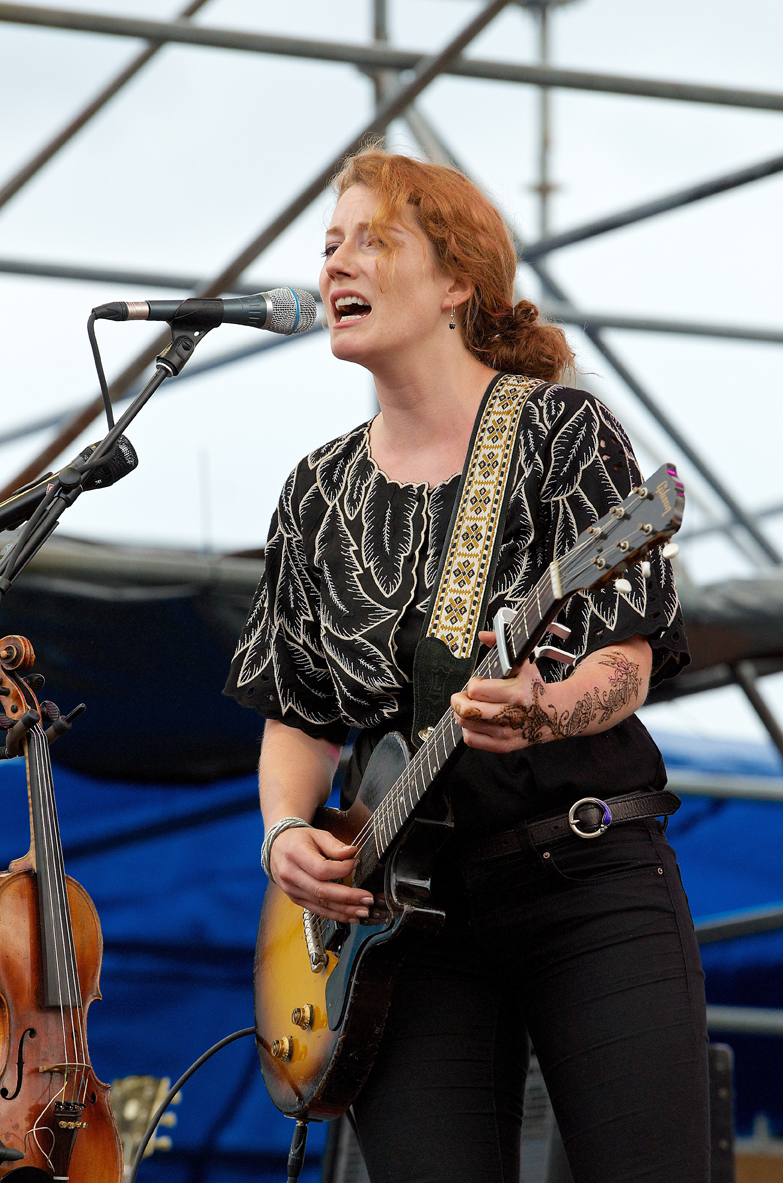
KATHLEEN EDWARDS
Kathleen Edwards is a folk-pop siren: all lilting voice, blood-orange hair and haunting songs. The Canada native’s music has been attracting acclaim the last few years, thanks to appearances on David Letterman’s show, a spot in the Billboard Top 40 albums chart and a new record produced by boyfriend Justin Vernon (a.k.a. Bon Iver).
Jersey Arts: Do you have a set way you write songs? Or do you find yourself coming up with an idea while shopping?
Kathleen Edwards: Totally. I think of stuff at the weirdest times. I find driving really conducive or moving to be really conducive — walking, riding my bicycle. Sometimes, something will come out of my mouth, or sometimes I’ll be reading a book and a line will come to me. It really starts with a little spark.
I’m the kind of songwriter who really believes in the idea that a song’s got to be about something. To me, a great song is: I know what the song’s about. It doesn’t even matter if that’s what the songwriter intended. It’s just like: You have a vision of what that song is about, and it means something to you.
There’s nothing more wonderful than listening to the Foster The People song [sings] “All the little kids with the pumped-up kicks.” That’s fun listening to, and I’ll put it on repeat any day of the week. But I have no clue what that song is about. But “Wrecking Ball” by Neil Young — when you hear Emmylou Harris sing that, you know what that song’s about because it’s a story.
JA: Do you remember your first song?
KE: Not like my first-first song. The first few pieces of s**t that I wrote were, you’re just trying stuff. But “Hockey Skates,” which is on my first record, I would say really that was truly the first formative song I wrote. And I still play it.
JA: How old were you when you wrote it?
KE: My guess is 21. I was writing songs before that. I’d even recorded demos and EPs, but if someone asked me to play one of those songs now, I couldn’t.
JA: Does it get easier the more you do it?
KE: It gets harder because you don’t want to do the same thing over and over again. I’ve had this experience where people come up to me and they’re like, “Ah man, I just love your first record.” That was 12 years ago, and I don’t even know how those songs came to be. That’s the magic of it, but at the same time, you’re like, “I think my best work is now.” All those things kind of f**k with your head when you’re thinking about continuing to grow as an artist.
JA: You’ve collaborated with everyone from Bon Iver to Bryan Adams. But who were you most nervous about playing with?
KE: I was most nervous about getting Bentmont Tench [the keyboardist] from Tom Petty & The Heartbreakers in on a session. He agreed to come and play on my record. And I was so nervous about that. Because Tom Petty & The Heartbreakers are my hero band. And it ended up that he’s such a lovely man and it was such a wonderful experience, but I was like a 5-year-old. I was like, “I wanna be cool. Be cool.”
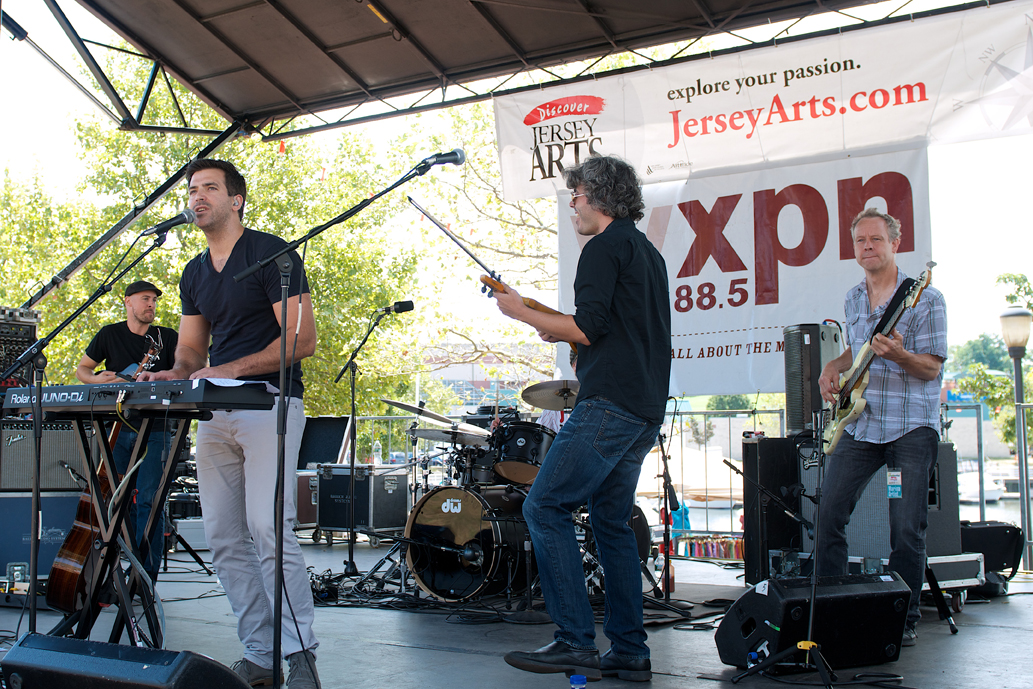
MATT SANTRY
A few years ago, Matt Santry was a college graduate with a degree in psychology and a job as a social worker for children with special needs. Now, the native of suburban Philadelphia has a different life: playing clubs across the country and hearing his pretty acoustic- and piano-laced music played on the radio.
Jersey Arts: So you went from social worker to musician?
Matt Santry: Yeah, I was always playing in college, and it just started to feel like a hobby. I was only playing once or twice a month. So I started just doing the restaurant circuit, where you see the guy playing in the corner. But I was making more money doing that than I was doing my day job. So that enabled me to make the transition.
JA: Is that a hard jump to make — to say I’m giving up a daily paycheck to make music?
MS: It’s stressful even right now. I’m having a great summer, but once October comes along, I don’t know. Something will come up. It always does.
JA: People have this thought that when you see musicians on stage or TV, you assume they’re making millions of dollars. But people don’t really understand they’re not.
MS: I think nowadays, there are more people that are doing it because there is a small economy for musicians. Just about anybody can get a job instructing guitar and play at the local bar. There’s a lot of people doing that. For me, I’ve always saw that as just a way to play more of my music and being a writer and performer.
The good part is: It’s easier than it was maybe 20 years ago to be a working musician. Because you have access to things you didn’t have — like iTunes and social media, where you’re able to tell your fans where you’re going to be and have them support you. I feel like maybe 20 or so years ago, it was all about a record label. And now that that isn’t really the case, I think it helps foster more independent music. But I think everybody’s kind of broke at the same time. [laughs] There’s no more big money.
JA: How important is a radio station like XPN to up-and-coming artists?
MS: It’s huge. I get a lot of new music from XPN. Good Old War? I heard about them through XPN. And I really dig them. Also, they’re not afraid to play local artists, where it’s a lot tougher when you get to chain radio stations. They’re not into that.
JA: If you had your own music festival, who would you have on the bill?
MS: [laughs] Anybody? I can go nuts?
JA: Sure.
MS: I’d have Peter Gabriel. He’s going to headline. Let’s have Pink Floyd, too. I’ll just go with some of the best shows I’ve seen. We’ll have Dave Matthews there.
CV: So what’s next for you?
MS: We’re doing a live record right now. We’re recording a number of shows this summer. And we’re using that as a way to raise money for a studio record. We’re selling a bootleg pass. You get access to all the live recordings for the rest of the year. Then 2013 will be more planning for the studio record.
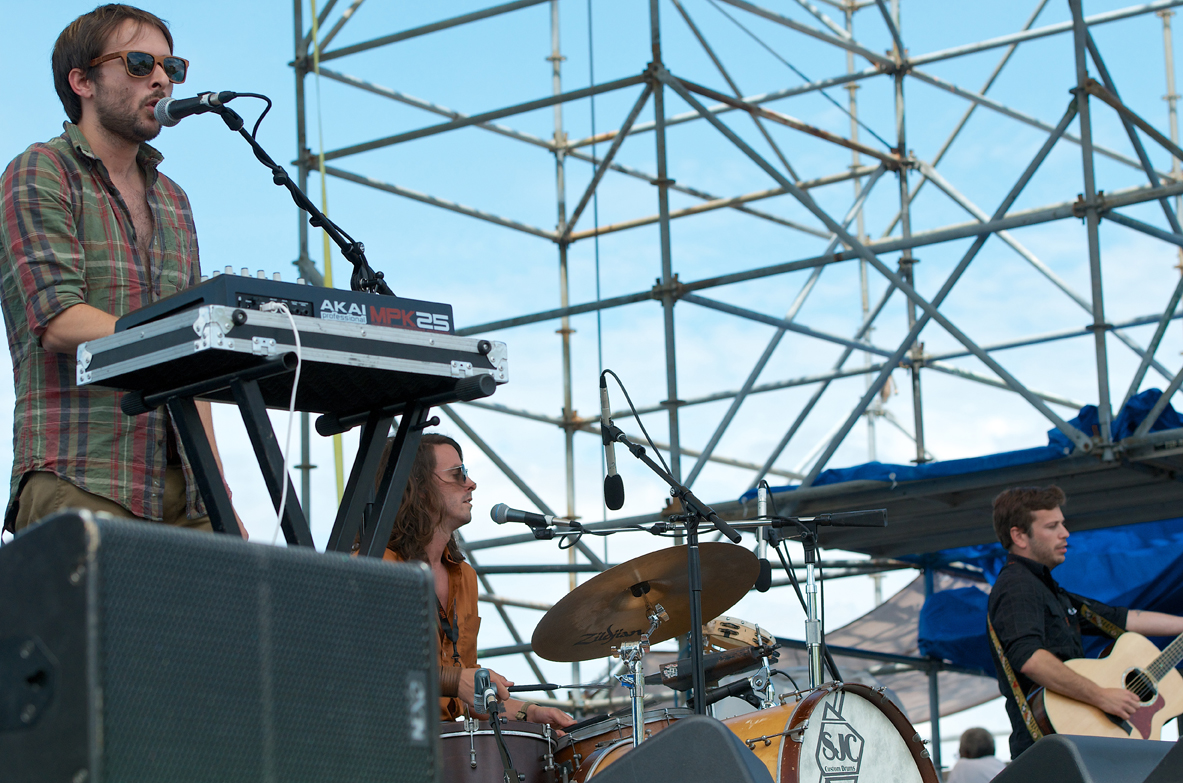
GOOD OLD WAR
The members of Good Old War always seem to be smiling. And why not? The Philly trio — guitarists Keith Goodwin and Daniel Schwartz and drummer Tim Arnold — plays sweet, hummable acoustic folk that sounds like it could have shared radio time with James Taylor and Joni Mitchell in the early 1970s. That and a relentless touring schedule have also made them indie darlings with a rabid fan base.
Jersey Arts: Is it intimidating to play a set with the Philly skyline rising above the stage behind you?
Daniel Schwartz: It feels really good. Being a Philly native and still living in Fishtown now, it’s a treat, man. Especially since we’re not a local band really. We don’t get to play Philly more than we play anywhere else. We tour so much. The city already looks like Narnia when you come back into it after being away from it for two months at a time/ [laughs] I love Philly so much.
JA: It doesn’t matter than you’re on the Jersey side of the river for this festival?
DS: Ah, no. Actually, there’s part of me that feels a very strong connection with Jersey. A lot of my family is South Jerseyites. We always did the Shore thing.
JA: Is playing live music like swimming — where you shouldn’t eat right before you step onstage?
DS: We definitely don’t eat before we go onstage. You don’t want to feel heavy. And we bounce around a lot. And we’re a singing band. Everyone will say if they sing, they probably won’t eat for like an hour before they play.
JA: A lot of the musicians around this festival are carrying iPhones. Has that changed songwriting — where now you’ll duck into a corner when you’re shopping at Target because you can record a song idea into your phone?
DS: That’s actually exactly what I do. I could show you — I just labeled them all. I have hundreds of song parts — we all do. I put my vocal warm-ups on there. I sing the warm-ups every day to my phone. We record practices on it every day, too.

